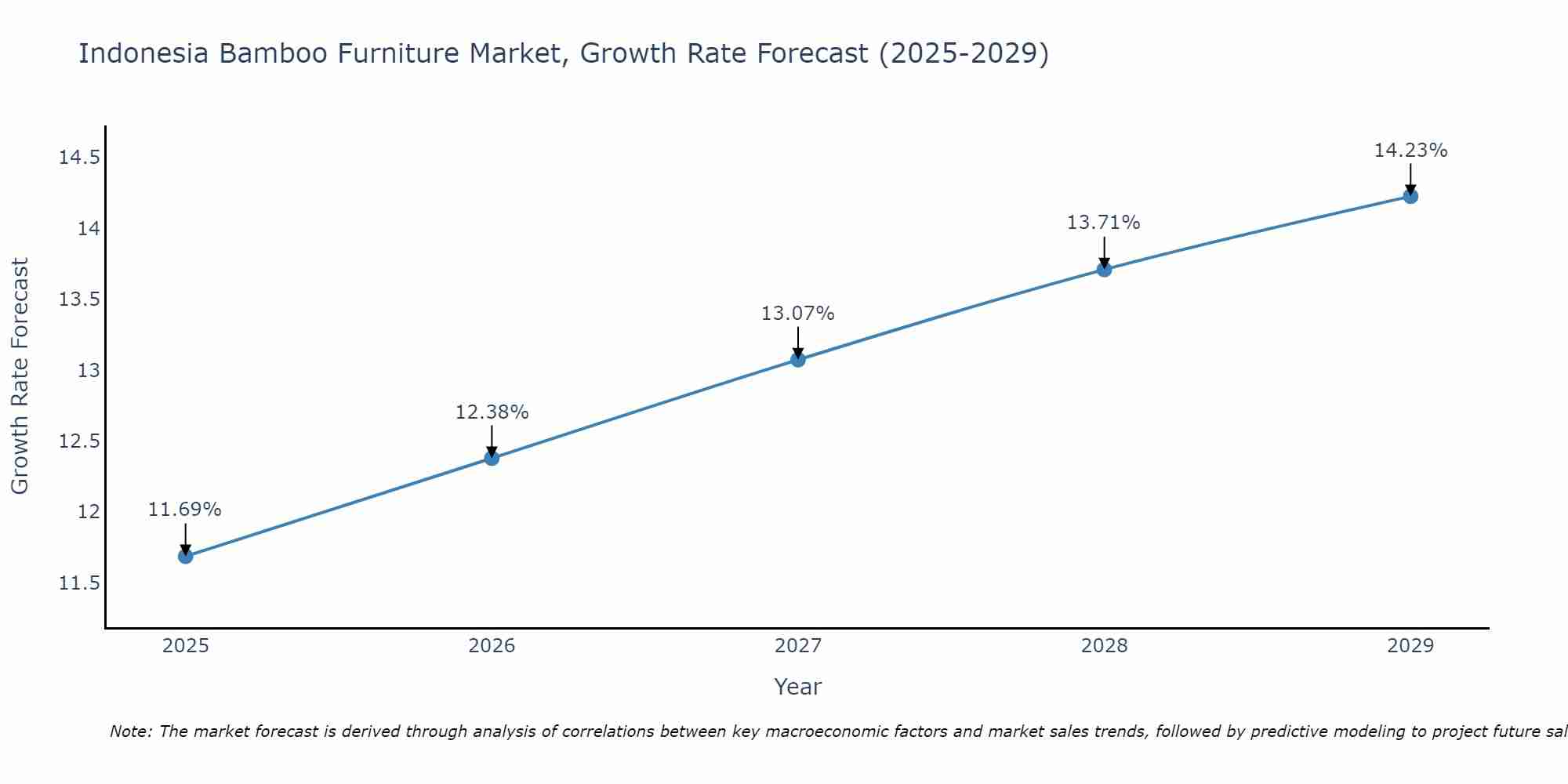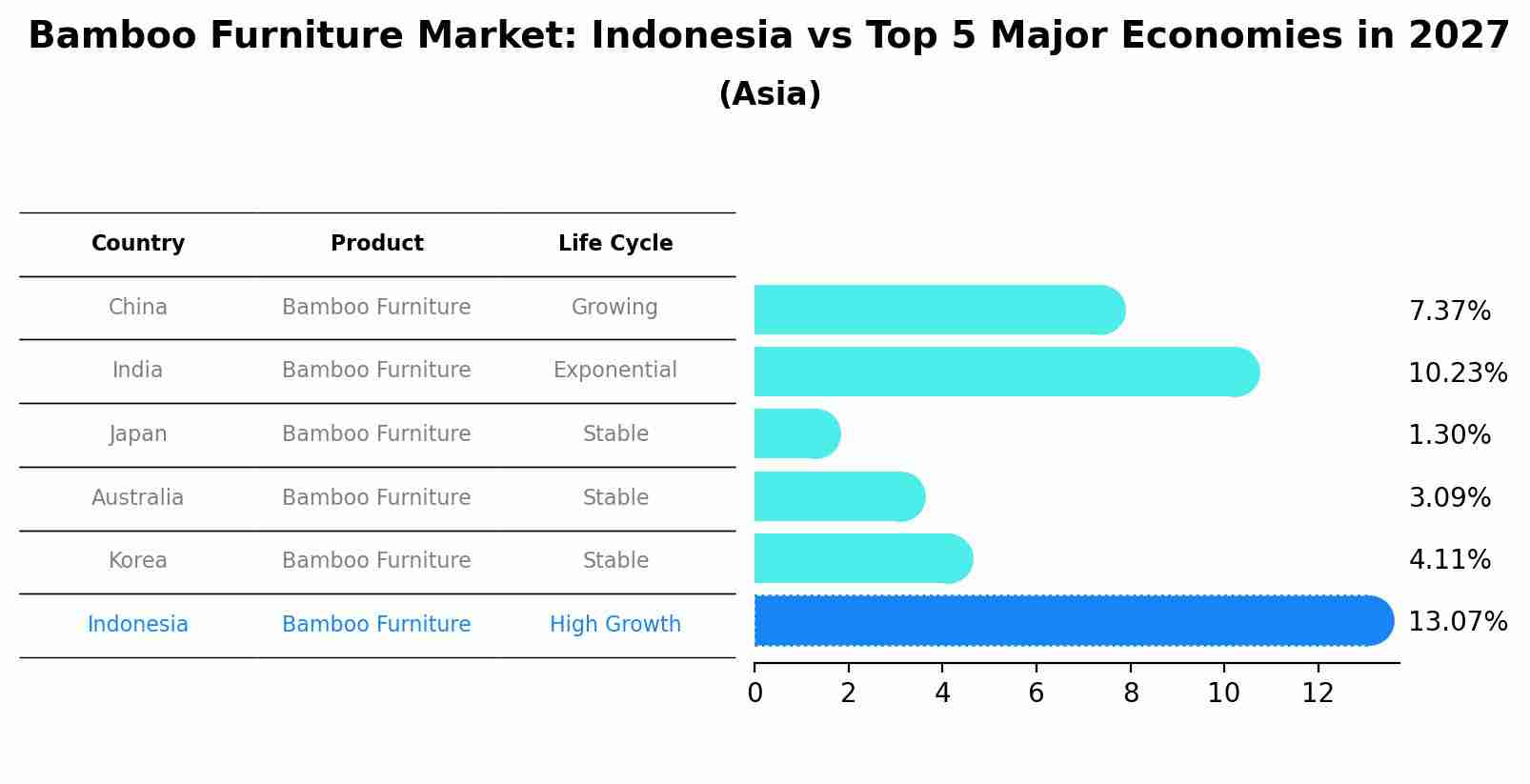Indonesia Bamboo Furniture Market (2025-2031) Outlook | Forecast, Growth, Companies, Value, Analysis, Revenue, Trends, Size, Industry & Share
| Product Code: ETC370888 | Publication Date: Aug 2022 | Updated Date: Apr 2025 | Product Type: Market Research Report | |
| Publisher: 6Wresearch | No. of Pages: 75 | No. of Figures: 35 | No. of Tables: 20 | |
Indonesia Bamboo Furniture Market Size Growth Rate
The Indonesia Bamboo Furniture Market is likely to experience consistent growth rate gains over the period 2025 to 2029. From 11.69% in 2025, the growth rate steadily ascends to 14.23% in 2029.

Bamboo Furniture Market: Indonesia vs Top 5 Major Economies in 2027 (Asia)
Indonesia's Bamboo Furniture market is anticipated to experience a high growth rate of 13.07% by 2027, reflecting trends observed in the largest economy China, followed by India, Japan, Australia and South Korea.

Indonesia Bamboo Furniture Market Synopsis
The Indonesia bamboo furniture market has gained prominence in recent years due to the growing emphasis on sustainable and eco-friendly furniture choices. Bamboo is a highly renewable resource, and its utilization in furniture manufacturing aligns with the global trend towards environmentally responsible products. The market offers a diverse range of bamboo furniture items, including chairs, tables, cabinets, and home decor. Moreover, bamboo furniture appeals to consumers seeking unique and aesthetically pleasing designs. Both domestic and international players are capitalizing on this demand, contributing to the expansion of the bamboo furniture market in Indonesia.
Drivers of the Market
The Indonesia Bamboo Furniture market is thriving due to several factors. Firstly, there is a growing global trend towards eco-friendly and sustainable products, and bamboo furniture aligns well with this trend due to its renewable and environmentally friendly properties. Consumers are increasingly looking for unique and aesthetically pleasing furniture options, and bamboo`s natural beauty and versatility make it a popular choice. Additionally, the government`s support for the bamboo industry, along with investments in research and development, is driving innovation in bamboo furniture design. Lastly, the export potential of Indonesia bamboo furniture is contributing to market growth as it gains popularity in international markets.
Challenges of the Market
The Indonesia Bamboo Furniture market faces challenges related to sustainable sourcing of bamboo and the need to adhere to international environmental regulations. Deforestation and unsustainable harvesting practices can harm the bamboo ecosystem, affecting the supply chain. Moreover, competition from other materials in the furniture industry can pose a challenge to the growth of bamboo furniture.
COVID-19 Impact on the Market
The pandemic initially disrupted the supply chain for bamboo furniture, causing delays in production and distribution. However, as people spent more time at home, the demand for sustainable and eco-friendly furniture increased. This led to a recovery in the market as consumers sought out bamboo furniture for their homes and gardens.
Key Players in the Market
The Indonesia Bamboo Furniture market is characterized by both traditional artisans and modern manufacturers. Key players in this market include companies like PT Indojati Bamboo Furniture, PT TUNGGAL BUMI SEJAHTERA, and Bali Bamboo Furniture, which offer a wide range of bamboo furniture products. Their commitment to sustainability and unique craftsmanship distinguishes them in the industry.
Key Highlights of the Report:
- Indonesia Bamboo Furniture Market Outlook
- Market Size of Indonesia Bamboo Furniture Market, 2024
- Forecast of Indonesia Bamboo Furniture Market, 2031
- Historical Data and Forecast of Indonesia Bamboo Furniture Revenues & Volume for the Period 2021-2031
- Indonesia Bamboo Furniture Market Trend Evolution
- Indonesia Bamboo Furniture Market Drivers and Challenges
- Indonesia Bamboo Furniture Price Trends
- Indonesia Bamboo Furniture Porter's Five Forces
- Indonesia Bamboo Furniture Industry Life Cycle
- Historical Data and Forecast of Indonesia Bamboo Furniture Market Revenues & Volume By Type for the Period 2021-2031
- Historical Data and Forecast of Indonesia Bamboo Furniture Market Revenues & Volume By Chairs & Tables for the Period 2021-2031
- Historical Data and Forecast of Indonesia Bamboo Furniture Market Revenues & Volume By Stools for the Period 2021-2031
- Historical Data and Forecast of Indonesia Bamboo Furniture Market Revenues & Volume By Beds for the Period 2021-2031
- Historical Data and Forecast of Indonesia Bamboo Furniture Market Revenues & Volume By Others for the Period 2021-2031
- Historical Data and Forecast of Indonesia Bamboo Furniture Market Revenues & Volume By End User for the Period 2021-2031
- Historical Data and Forecast of Indonesia Bamboo Furniture Market Revenues & Volume By Residential for the Period 2021-2031
- Historical Data and Forecast of Indonesia Bamboo Furniture Market Revenues & Volume By Commercial for the Period 2021-2031
- Indonesia Bamboo Furniture Import Export Trade Statistics
- Market Opportunity Assessment By Type
- Market Opportunity Assessment By End User
- Indonesia Bamboo Furniture Top Companies Market Share
- Indonesia Bamboo Furniture Competitive Benchmarking By Technical and Operational Parameters
- Indonesia Bamboo Furniture Company Profiles
- Indonesia Bamboo Furniture Key Strategic Recommendations
Frequently Asked Questions About the Market Study (FAQs):
- Single User License$ 1,995
- Department License$ 2,400
- Site License$ 3,120
- Global License$ 3,795
Search
Related Reports
- ASEAN Bearings Market (2025-2031) | Strategy, Consumer Insights, Analysis, Investment Trends, Opportunities, Growth, Size, Share, Industry, Revenue, Segments, Value, Segmentation, Supply, Forecast, Restraints, Outlook, Competition, Drivers, Trends, Demand, Pricing Analysis, Competitive, Strategic Insights, Companies, Challenges
- Europe Flooring Market (2025-2031) | Outlook, Share, Industry, Trends, Forecast, Companies, Revenue, Size, Analysis, Growth & Value
- Saudi Arabia Manlift Market (2025-2031) | Outlook, Size, Growth, Trends, Companies, Industry, Revenue, Value, Share, Forecast & Analysis
- Uganda Excavator, Crane, and Wheel Loaders Market (2025-2031) | Strategy, Consumer Insights, Analysis, Investment Trends, Opportunities, Growth, Size, Share, Industry, Revenue, Segments, Value, Segmentation, Supply, Forecast, Restraints, Outlook, Competition, Drivers, Trends, Demand, Pricing Analysis, Competitive, Strategic Insights, Companies, Challenges
- Rwanda Excavator, Crane, and Wheel Loaders Market (2025-2031) | Strategy, Consumer Insights, Analysis, Investment Trends, Opportunities, Growth, Size, Share, Industry, Revenue, Segments, Value, Segmentation, Supply, Forecast, Restraints, Outlook, Competition, Drivers, Trends, Demand, Pricing Analysis, Competitive, Strategic Insights, Companies, Challenges
- Kenya Excavator, Crane, and Wheel Loaders Market (2025-2031) | Strategy, Consumer Insights, Analysis, Investment Trends, Opportunities, Growth, Size, Share, Industry, Revenue, Segments, Value, Segmentation, Supply, Forecast, Restraints, Outlook, Competition, Drivers, Trends, Demand, Pricing Analysis, Competitive, Strategic Insights, Companies, Challenges
- Angola Excavator, Crane, and Wheel Loaders Market (2025-2031) | Strategy, Consumer Insights, Analysis, Investment Trends, Opportunities, Growth, Size, Share, Industry, Revenue, Segments, Value, Segmentation, Supply, Forecast, Restraints, Outlook, Competition, Drivers, Trends, Demand, Pricing Analysis, Competitive, Strategic Insights, Companies, Challenges
- Israel Intelligent Transport System Market (2025-2031) | Strategy, Consumer Insights, Analysis, Investment Trends, Opportunities, Growth, Size, Share, Industry, Revenue, Segments, Value, Segmentation, Supply, Forecast, Restraints, Outlook, Competition, Drivers, Trends, Demand, Pricing Analysis, Competitive, Strategic Insights, Companies, Challenges
- Uganda Precast and Aggregate Market (2025-2031) | Strategy, Consumer Insights, Analysis, Investment Trends, Opportunities, Growth, Size, Share, Industry, Revenue, Segments, Value, Segmentation, Supply, Forecast, Restraints, Outlook, Competition, Drivers, Trends, Demand, Pricing Analysis, Competitive, Strategic Insights, Companies, Challenges
- Australia IT Asset Disposal Market (2025-2031) | Strategy, Consumer Insights, Analysis, Investment Trends, Opportunities, Growth, Size, Share, Industry, Revenue, Segments, Value, Segmentation, Supply, Forecast, Restraints, Outlook, Competition, Drivers, Trends, Demand, Pricing Analysis, Competitive, Strategic Insights, Companies, Challenges
Industry Events and Analyst Meet
Our Clients
Whitepaper
- Middle East & Africa Commercial Security Market Click here to view more.
- Middle East & Africa Fire Safety Systems & Equipment Market Click here to view more.
- GCC Drone Market Click here to view more.
- Middle East Lighting Fixture Market Click here to view more.
- GCC Physical & Perimeter Security Market Click here to view more.
6WResearch In News
- Doha a strategic location for EV manufacturing hub: IPA Qatar
- Demand for luxury TVs surging in the GCC, says Samsung
- Empowering Growth: The Thriving Journey of Bangladesh’s Cable Industry
- Demand for luxury TVs surging in the GCC, says Samsung
- Video call with a traditional healer? Once unthinkable, it’s now common in South Africa
- Intelligent Buildings To Smooth GCC’s Path To Net Zero













